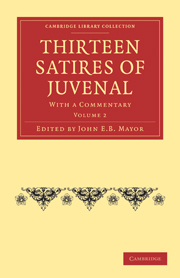Book contents
Summary
Soldiers enjoy an almost entire exemption from punishment (1–34), are not harassed by protracted law-suits (35–50), and hold property in their own right, while their fathers yet live (51–60).
Schol. ‘ista a plerisque exploditur, et dicitur non esse Iuvenalis.’ On the other hand it is quoted as Juvenal's by Servius (Aen. i 16 ver. 6. ii 106 ver. 42) and Priscian (viii 31 and 82 ver. 2). The opinions of modern critics are collected by Ruperti and Heinrich; add, in favour of the genuineness of the satire, K. F. Hermann, Düntzer, W. E. Weber, O. Jahn. That the work is imperfect is evident: for we have no complete list of the communia commoda, which were but the beginning of the proposed theme (7): the instances of special good fortune, alluded to in verses 1–6, are not touched upon. The objections which have been taken to the language are frivolous in themselves, and easily outweighed by the excellence of 4 seq. 9 seq. 24–34 cet. F. Bücheler (Rhein. Mus. xxix 1874 636. cf. Ribbeck der echte ‥ Juvenal 175 seq.) explains the abrupt termination of the fragment. ‘nam in medio fere corpore saturaram codices Pithoeanus et Sangallensis triginta versibus (vii 129–158) quae olim adscripta fuere scholia omittunt. casu aliquo Iahnius ea in communi archetypo intercepta existimavit, ego librorum naturae non video quid sit magis consentaneum quam totum interiisse folium, trice num igitur versuum foliis archetypum compositum puto.
- Type
- Chapter
- Information
- Thirteen Satires of JuvenalWith a Commentary, pp. 401 - 411Publisher: Cambridge University PressPrint publication year: 2010



